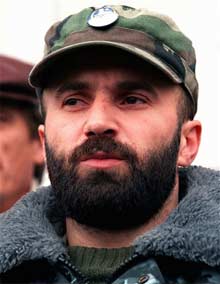
BASAEV’S DEATH DOES NOT SOLVE KREMLIN WORRIES IN NORTH CAUCASUS
Publication: Eurasia Daily Monitor Volume: 3 Issue: 134
By:

Chechen warlord Shamil Basaev died in Ingushetia on Monday, July 10. He perished either accidentally while preparing a sabotage operation or, according to the official version, he was eliminated by Russian special forces. Following the news, Russian Defense Minister Sergei Ivanov, visited Grozny, the Chechen capital, and triumphantly declared, “Basaev has been eliminated!” He added, “This will permit reconstruction and peace building in Chechnya to occur more effectively” (ORT, July 11).
Many military observers in Russia believe that Basaev’s death means the end of the Chechen and North Caucasian insurgency. “The elimination of Shamil Basaev brings to an end the organized resistance of bandit formations not only in Chechnya, but in the whole North Caucasus,” predicted Alexander Khramchikhin from the Institute of Political and Military Analyses. Similarly, Anatoly Tsiganok, head of the Center for Military Forecasting, declared that liquidating Basaev would deal a fatal blow to the leaders of the remaining bandit formations in the North Caucasus (newsru.com, July 10).
Nevertheless, Russian President Vladimir Putin did not sound as optimistic as the other observers. “We clearly understand that the terrorist threat is still very big and we should keep it in sight; anti-terrorist activity should be strengthened and become more effective,” Putin said after Federal Security Service director Nikolai Patrushev had briefed him on the death of Basaev (RTR, July 10).
After his victory statement in Grozny, Ivanov added, “The elimination of the terrorist [Basaev] does not mean that the bandit underground is finished.” Ivanov then visited Khankala, the main Russian military base in Chechnya, for closed-door discussions with Russian generals regarding the “reconstruction of the republic’s infrastructure” (Agenstvo Natsionalnikh Novostei, July 11).
Ivanov’s visit to Chechnya is the beginning of a broader inspection tour of the North Caucasus. He will observe the upcoming large-scale military exercises in the region, the second round for this year (see EDM, April 27). The drill will involve all of the North Caucasus regions, including North Ossetia, Ingushetia, Dagestan, Stavropol krai, and even nearby Volgograd oblast, which is not actually part of the Caucasus (Nezavisimaya gazeta, July 11). The exercises will practice landing airborne troops from the Russian 7th division and marine units from the Caspian Fleet to an area occupied by rebels after a sudden attack by “bandit formations” (Nezavisimaya gazeta, July 11). General Alexander Baranov, the commander of the North Caucasian Military District, will direct the maneuvers.
Also this month General Yevgeny Baryaev was named the new commander of the United Army Group in Chechnya. He will be the third new commander since early 2005 (kavkaz.strana.ru, July 7). Baryaev’s appointment and the latest drill reveal the Russian authorities’ continuing worry that the situation in the North Caucasus could seriously deteriorate any time. Moreover, the continuing rebel attacks in Chechnya, Ingushetia, and Dagestan could be a serious problem even if their frequency does not increase. The main question now is how the insurgency will react to Basaev’s death, and whether his death will change the tactics of the Caucasian militants.
After Basaev’s death Doku Umarov, another infamous Chechen field commander and the rebels’ new political leader, became the sole leader of the insurgency. Together with Basaev, Umarov masterminded the successful raid on Ingushetia in 2004. According to kavkaz.strana.ru, a website known for its close links with the FSB and Russian military circles, Umarov had clashed with Basaev when the latter belittled his role in preparing for the raid. Umarov also organized a successful attack on Grozny in August 2004.
Last year Umarov commanded almost all of the rebel units inside Chechnya, while Basaev traveled throughout the North Caucasus. Umarov began to branch out earlier this spring, when he and Basaev traveled together throughout the region to inspect local rebel groups. After the death of Abdul-Khalim Sadulaev, political head of the Chechen insurgency, on June 17, the rebels in the North Caucasus swore an oath of loyalty to Umarov as their new top leader (Kavkaz Center, July 9).
With Basaev gone, Umarov must decide how best to control the Caucasian front. He could follow Basaev’s example and continuously travel from one region to another while preparing large-scale sabotage operations in the region. However, unlike Basaev, Umarov prefers to remain in the mountains, usually the Shatoi district of Chechnya, and he invites field commanders to his headquarters, where he issues plans they are to implement in their respective sectors. This year Umarov has already tried to use these tactics on a broader scale. In an interview with the Radio Liberty Chechen service, Umarov promised to send a group of experienced Chechen fighters to help young rebels in Kabardino-Balkaria (Radio Liberty, April 17).
However, Umarov could face rival claims to succeed Basaev. There are still many active veterans of the first Chechen war, including Abdul-Khalim Menzhidov who, together with the late Ruslan Gelaev, helped rebel forces from Georgia enter Chechnya via the Russian border in 2002. Isa Munaev served as commandant of Chechnya under former president Aslan Maskhadov. Abubakar Elmurzaev is also a former Maskhadov ally, while Supiyan Abdualev was Basaev’s deputy. There are also such figures as Sultan Khadisov, commander of rebel groups in eastern Chechnya; Suleiman Ilmurzev, rebel commander in Vedeno district; and another Basaev deputy, Musa Iskiev, commander of the rebel groups in Chechnya’s Shali district. Finally, there is also a new generation of commanders emerging, known only by their nom de guerre, including “Khalid” and “Nuradin.” While all of the commanders mentioned above are Chechens, there are also potential leaders among the young rebel commanders in Dagestan, Kabardino-Balkaria, Karachaevo-Cherkessia, and Ingushetia. The Kremlin recognizes the potential of these commanders, which explains why it is no hurry to cancel anti-terrorist drills and military maneuvers in the North Caucasus even after Basaev’s death.




